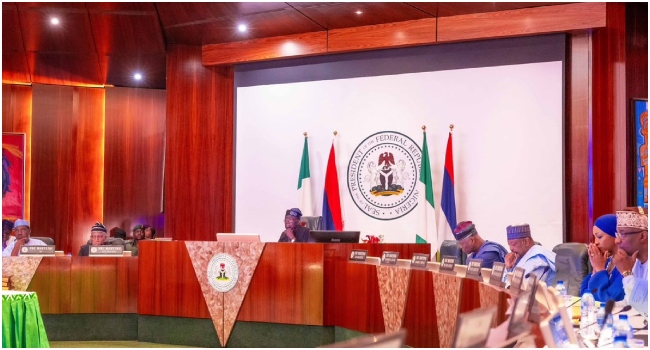In the midst of Nigeria’s ongoing economic turmoil, a wave of calls is surging for President Senator Bola Ahmed Tinubu to conduct a comprehensive review of the country’s economic policies, drawing inspiration from Ghana’s remarkable turnaround following a similar crisis.
Ghana, Nigeria’s West African neighbor, grappled with a severe currency devaluation crisis that prompted a significant exodus of Ghanaians seeking shelter in Nigeria, only to return home as their nation underwent a remarkable economic revival.
Economic experts and analysts are increasingly pointing fingers at government actions – or the lack thereof – as a primary driver behind Nigeria’s current economic quagmire.
Nigerian policymakers must internalize the fact that market forces operate independently of political considerations and are solely responsive to tangible measures taken by governing bodies.
One pivotal area that demands immediate attention is the issue of subsidy removal in Nigeria.
Simply abolishing subsidies without addressing deep-rooted problems like subsidy theft and corruption could backfire severely.
Allowing individuals complicit in subsidy malfeasance to retain influential positions in the private sector undermines the effectiveness of endeavors aimed at steering the economy back on track.
Furthermore, Nigerian authorities must recognize the potential fallout of simultaneously eliminating energy subsidies and floating the national currency.
Such a dual-pronged approach could trigger a substantial uptick in inflation, exacerbating the financial hardships faced by ordinary citizens across the country.
As Nigeria confronts its economic tribulations, the need to draw insights from the success stories of other nations, notably Ghana, becomes increasingly imperative.
Through a meticulous reassessment and potential overhaul of economic policies, Nigeria can navigate a path toward economic rejuvenation and sustainable growth, fostering prosperity for all its citizens.
This critical juncture presents a pivotal opportunity for Nigeria to capitalize on lessons learned from Ghana’s resurgence without much dependence on loans or advances from multilateral institutions like the International Monetary Fund (IMF) and World Bank and still forge a brighter economic future for its populace.
Ghana’s tumultuous journey through economic and monetary crisis under the leadership of the late President Jerry Rawlings stands as a testament to the nation’s resilience and the visionary leadership that steered it towards recovery and prosperity.
The West African nation found itself in the throes of a severe economic downturn and currency devaluation crisis, testing the resolve of its people and institutions to the breaking point.
Amidst the chaos and uncertainty, President Jerry Rawlings emerged as a beacon of hope and a catalyst for change.
His administration implemented bold and decisive measures to address the root causes of the crisis, confronting issues of corruption, mismanagement, and economic inefficiency head-on. Rawlings’ leadership was characterized by a fierce commitment to transparency, accountability, and social justice, principles that would form the bedrock of Ghana’s recovery efforts.
One of the key pillars of Ghana’s resurgence was the implementation of far-reaching economic reforms aimed at stabilizing the country’s currency and restoring investor confidence.
Rawlings’ government prioritized fiscal discipline, prudent monetary policies, and structural adjustments to reinvigorate the economy and pave the way for sustainable growth.
Furthermore, President Rawlings spearheaded efforts to foster domestic industries, attract foreign investment, and promote export-led growth as part of a comprehensive strategy to diversify Ghana’s economy and reduce its reliance on volatile commodity markets.
His administration’s focus on infrastructure development, education, and healthcare also played a crucial role in laying the foundations for long-term prosperity and social development.
Through bold leadership, unwavering determination, and a clear vision for the future, President Jerry Rawlings led Ghana out of the depths of economic despair and onto a path of renewal and progress without further debt burden and without impoverishing its citizens through policy reforms.
His legacy as a transformative leader who guided his nation through adversity and toward prosperity continues to inspire generations of Ghanaians and serves as a testament to the power of visionary leadership in times of crisis.
Femi Adebisi
adebisiolufemi72@gmail.com




